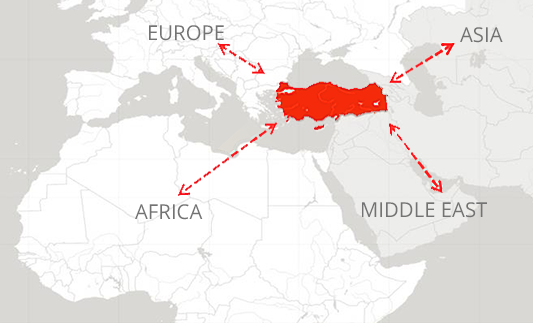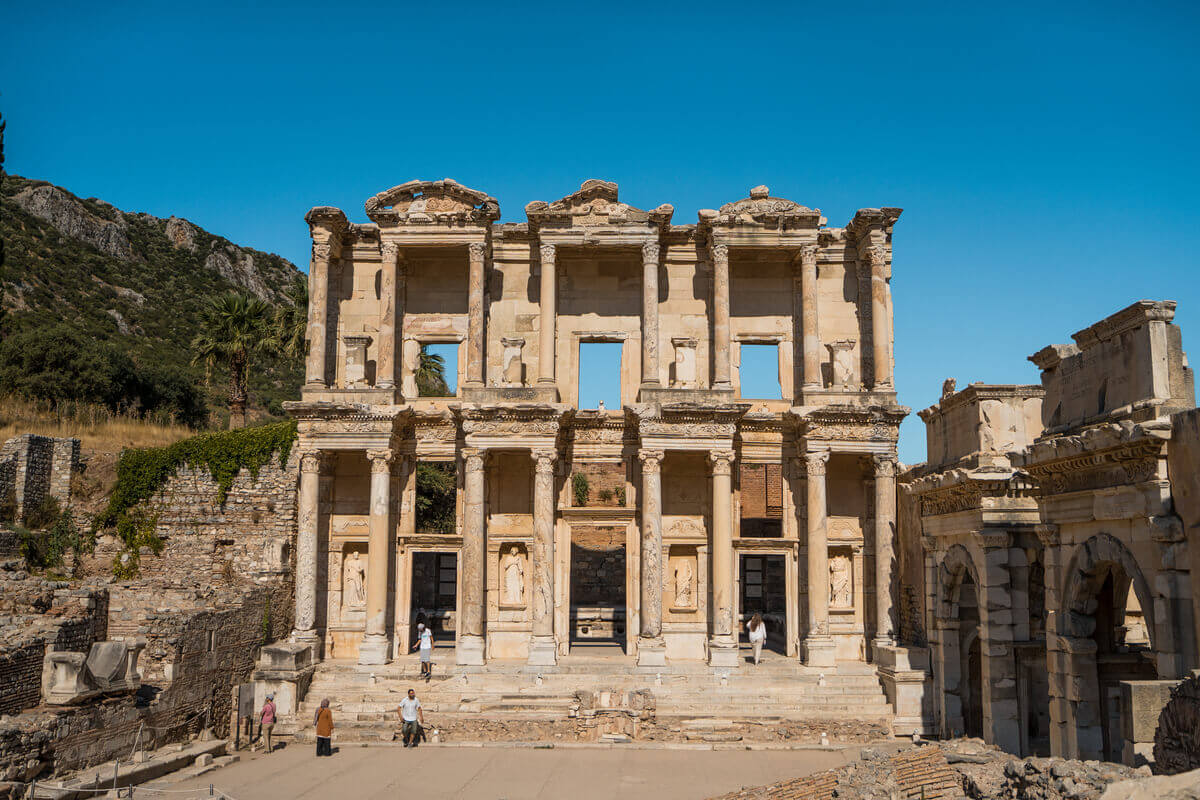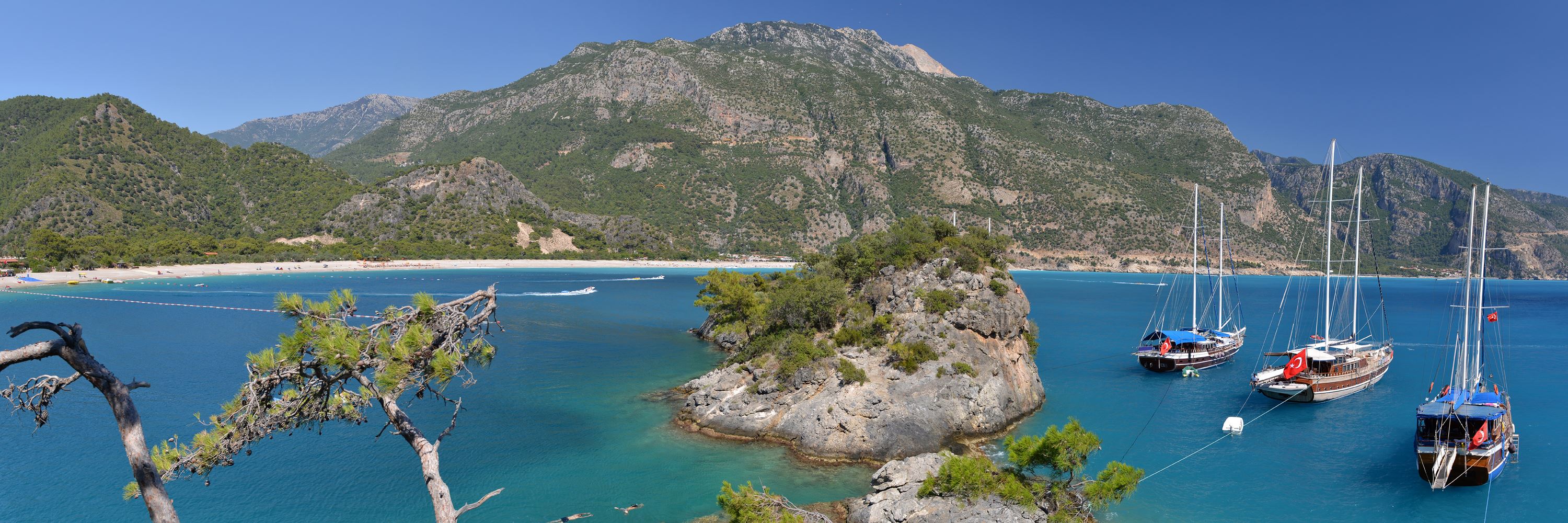Turkey is among the most popular and captivating tourist destinations worldwide, blending diverse cultures with breathtaking landscapes. Each year, Turkey welcomes record-breaking numbers of visitors from all around the globe. In this article, we will delve into the journey of traveling to Turkey, covering all the details and angles. We will explore how to make the most of car rentals to navigate its exciting streets, and visit its enchanting places safely and comfortably. We will also address crucial tips to consider for a comfortable and secure stay, along with avoiding potential challenges that might arise during the trip.
1-Set Your Visit Goal Before Arrival to Cut Costs by 30%
Turkey, this vast homeland, is brimming with tourist destinations, whether coastal, mountainous, forested, religious sites, museums, exhibitions, medical tourism, and even business tourism. It's essential to determine your goal before your arrival. Choosing a specific travel goal can reduce costs by up to 30%, especially if planned two to three months in advance of the departure date. Pre-planning saves you both money and time.
2-Booking Your Flight
.jpeg)
When booking your flight, choose Tuesdays and Wednesdays. Flights on these days are generally cheaper than the rest. Avoid booking flights during weekends and official holidays, as they tend to be more expensive. Book your flight tickets from local Turkish websites.
3-Accommodation Booking
.jpeg)
Select local websites for hotel reservations. Avoid using Booking.com as it's currently blocked in Turkey and the available information is not up-to-date. Booking a hotel with breakfast helps you save time and money. Breakfast experiences are distinctive in Turkish hotels and restaurants. Don't forget to read reviews from previous customers before booking, as their experiences bring you closer to reality.
4-Use Local Communications
Upon arrival at the airport, get a Turkish SIM card with an internet package and contact hotels and taxi services through messaging apps like WhatsApp, a widely used app for communication. Maintain communication as much as possible in Turkish. Utilize Google Translate for short sentences, choosing a formal language.
5-Avoid Cultural Issues
.jpeg)
Respect the Turkish people's customs and traditions. Remember that speaking loudly and not adhering to public place rules can lead to real problems. Make sure to respect laws, behave politely, and carry your culture and your country's culture in the best manner.
6-Safety First
.jpeg)
Indeed, Turkey is a safe country with a strong protection system, but it's always wise to take necessary precautions to avoid any issues. Here are some safety tips for traveling in Turkey:
7-Keep valuable items carefully.
.jpeg)
- Handle money cautiously.
- Safeguard your personal documents.
- Be cautious in tourist areas.
- Follow local authorities' guidance.
8-Car Rental
If you plan to rent a car, strongly consider booking it before your arrival and picking it up directly at the airport. Several car rental companies offer this service at international airports. Check customer reviews before booking. Use reputable companies for online car rental.
9-Taxi
Avoid unprofessional drivers. Contact taxi rental companies, order taxis from your hotel, and avoid using taxis before the meter is turned on.
10-Shopping and Enjoyment
Enjoy visiting local markets and wandering the streets of Turkey. Ask locals about attractions and enjoyable activities.
In conclusion, consider yourself a local citizen and experience the entirety of Turkey's charm. Enjoy its captivating details, immerse yourself in its diverse heritage, and explore its tourist landmarks with fresh eyes. Do not hesitate to savor the delicious Turkish cuisine and embrace its rich culture. Benefit from the tips mentioned in this guide to have the best experience at the lowest cost. Your trip to Turkey will be an opportunity to discover what's new and unique, leaving a beautiful mark on your memory and that of your family.
Turkey is often preferred as a trusted destination for several reasons:
Strategic Location: Turkey serves as a bridge between Europe and Asia, making it a strategic hub for trade and cultural exchange. Its location offers access to markets in both continents, making it an attractive destination for business opportunities.
Stable Economy: Turkey has a robust and diversified economy, with sectors such as tourism, manufacturing, and agriculture contributing to its growth. The country has experienced relatively stable economic development over the years, attracting investors and businesses.
Cultural Heritage: Turkey is rich in history and cultural heritage, with numerous historical sites, ancient ruins, and architectural wonders. Its diverse cultural background, influenced by various civilizations and empires, makes it a fascinating destination for tourists and scholars.
Hospitality and Warmth: Turkish people are known for their warm hospitality and friendliness towards visitors. The genuine hospitality extended to tourists and business partners creates a welcoming environment and fosters trust.
Infrastructure and Connectivity: Turkey has invested heavily in its infrastructure, including transportation networks, modern airports, and a well-connected road and rail system. This facilitates ease of travel within the country and enhances business connectivity.
Political Stability: Turkey has a long-standing tradition of political stability, which provides a favorable environment for businesses and foreign investment. The government has implemented reforms to improve the investment climate and attract international companies.
Tourism Potential: Turkey offers diverse and breathtaking natural landscapes, from pristine beaches to stunning mountains and historical landmarks. The country's tourism industry has flourished, attracting millions of visitors each year and further strengthening its reputation as a trusted destination.
Cultural Diversity: Turkey is known for its multicultural society, with a blend of different ethnicities, religions, and languages. This cultural diversity fosters inclusivity and creates an environment where different perspectives and ideas are welcomed.

Turkey is a country rich in history, culture, and natural beauty, offering a wide range of attractions for visitors. Some of the best places to visit in Turkey include:
Istanbul: Explore the stunning architecture of the Hagia Sophia, the Blue Mosque, and Topkapi Palace. Take a stroll through the historic Grand Bazaar and enjoy a cruise along the Bosphorus.
Cappadocia: Marvel at the unique rock formations, known as fairy chimneys, and take a hot air balloon ride for a breathtaking view. Explore the ancient underground cities and visit the Göreme Open Air Museum.
Pamukkale: Witness the mesmerizing white terraces of calcium-rich mineral waters and soak in the thermal pools. Don't miss the ancient city of Hierapolis, with its well-preserved theater and necropolis.
Ephesus: Step back in time as you wander through the well-preserved ruins of this ancient Roman city. Visit the Library of Celsus, the Great Theater, and the Temple of Artemis, one of the Seven Wonders of the Ancient World.
Antalya: Enjoy the beautiful beaches, visit the historic Old Town (Kaleici), and explore the ancient ruins of Aspendos and Perge. Don't forget to take a boat trip along the stunning Turquoise Coast.
Bodrum: Relax in this coastal town known for its vibrant nightlife and historic landmarks such as Bodrum Castle. Explore the underwater world at the Bodrum Underwater Archaeology Museum.
Pamir Plateau: Discover the natural beauty of this remote region, including Lake Van, Mount Ararat, and the Ishak Pasha Palace. Experience traditional Kurdish culture and hospitality.
Troy: Uncover the ancient ruins of Troy, famous for the Trojan War, and explore the replica of the iconic wooden horse. Visit the onsite museum to learn about the city's fascinating history.
Mount Ararat: Embark on a challenging trek to the highest peak in Turkey, Mount Ararat, located in eastern Turkey. Enjoy stunning views and a sense of accomplishment.
Trabzon: Visit the picturesque Sumela Monastery, perched on a cliffside, and explore the beautiful Uzungol Lake. Experience the unique blend of Turkish and Black Sea cultures.
These are just a few highlights, and Turkey offers much more to explore, including the stunning beaches of the Turquoise Coast, the ancient ruins of Troy and Pergamon, the natural wonders of Pamukkale and Cappadocia, and the vibrant cities of Izmir and Ankara
.jpeg)
Turkey is home to a wealth of historical sites that showcase its rich cultural heritage. Here are ten of the best historical places to visit in Turkey:
Ephesus: Explore the well-preserved ancient city of Ephesus, including the Library of Celsus, the Great Theater, and the Temple of Artemis.
Troy: Discover the legendary city of Troy, known for the Trojan War, and visit the archaeological site to see the remains of this ancient civilization.
Hierapolis-Pamukkale: Marvel at the white terraces of Pamukkale and explore the ancient city of Hierapolis, with its well-preserved theater, necropolis, and Roman baths.
Göbekli Tepe: Visit the world's oldest known temple complex, dating back over 11,000 years, and marvel at the intricate stone carvings.
Aphrodisias: Explore the ancient city of Aphrodisias, known for its well-preserved stadium, theater, and Temple of Aphrodite.
Hattusha: Step into the ancient capital of the Hittite Empire and explore the ruins of Hattusha, including the Lion Gate, the Great Temple, and the Royal Palace.
Aspendos: Admire the remarkably well-preserved Roman theater in Aspendos, one of the best-preserved ancient theaters in the world
Pergamon: Discover the ancient city of Pergamon, home to impressive ruins such as the Acropolis, the Library of Pergamon, and the theater
Ani: Visit the abandoned medieval city of Ani, once a flourishing center of trade and culture, and explore its ruined churches, palaces, and walls.
Mount Nemrut: Climb Mount Nemrut to witness the colossal statues and ancient tomb-sanctuary of King Antiochus I at the summit
These historical sites offer a glimpse into Turkey's fascinating past and provide an opportunity to immerse yourself in its rich history and heritage.

Turkey is home to several international airports that connect the country to various destinations around the world. Some of the major international airports in Turkey include:
Istanbul Airport (IST) - Located in Istanbul, it is the largest and busiest airport in Turkey, serving as a major international hub.
Sabiha Gökçen International Airport (SAW) - Also located in Istanbul, it is the second international airport serving the city and mainly handles low-cost carriers and domestic flights.
Antalya Airport (AYT) - Situated in Antalya, a popular tourist destination, it serves as a gateway to the Mediterranean region of Turkey.
Izmir Adnan Menderes Airport (ADB) - Located in Izmir, it is an important international airport serving the western coast of Turkey and the Aegean region.
Ankara Esenboğa Airport (ESB) - Serving the capital city, Ankara, it is a major international airport providing connections to various destinations in Turkey and beyond.
Dalaman Airport (DLM) - Situated in Dalaman, it serves as a primary gateway to the southwestern coastal resorts, including Marmaris, Fethiye, and Bodrum.
Bodrum Milas Airport (BJV) - Located in Bodrum, it is a popular international airport serving the Bodrum Peninsula and nearby resort towns.
Adana Şakirpaşa Airport (ADA) - Serving the city of Adana, it is an international airport connecting the southeastern region of Turkey to other countries.

The best season to visit Turkey depends on your preferences and the specific regions you plan to explore. Here's a breakdown of the seasons and their characteristics:
Spring (April to June): Spring is generally a pleasant time to visit Turkey, with mild temperatures and blooming landscapes. It's a great time to explore Istanbul, Cappadocia, and the Aegean and Mediterranean regions. The weather is ideal for outdoor activities and sightseeing, and the tourist crowds are relatively smaller compared to summer.
Summer (July to August): Summer is the peak tourist season in Turkey, particularly along the coastal areas. The weather is hot and dry, with temperatures often exceeding 30°C (86°F). This is the best time to enjoy the beautiful beaches, vibrant nightlife, and outdoor activities. Popular tourist destinations like Antalya, Bodrum, and Marmaris are bustling with visitors during this time.
Autumn (September to November): Autumn is another great season to visit Turkey, especially in September and October. The weather remains pleasant, and the crowds start to thin out. It's an excellent time to explore historical sites, hike in national parks, and experience cultural festivals. Cappadocia and Istanbul are particularly beautiful during this season.
Winter (December to February): Winter in Turkey varies across regions. Coastal areas experience milder temperatures, while central and eastern regions, including Cappadocia and the ski resorts, have colder temperatures and occasional snowfall. Winter is an excellent time for winter sports enthusiasts, as Turkey offers several ski resorts. Istanbul during the winter months can be rainy but less crowded, allowing for more intimate experiences.
It's worth noting that Turkey is a diverse country with varying climates. Coastal areas have a Mediterranean climate, while inland regions have more continental climates. Before planning your trip, consider the specific activities you wish to undertake and the regions you plan to visit to choose the most suitable season for your visit.

In addition to considering the seasons, here are a few more factors to keep in mind when planning your visit to Turkey:
Tourist Crowds: If you prefer to avoid large crowds and long queues at popular attractions, consider visiting during the shoulder seasons (spring and autumn) when tourist numbers are lower compared to the peak summer months.
Special Events and Festivals: Turkey hosts various cultural, music, and food festivals throughout the year. Research and check if any festivals or events align with your interests and consider planning your visit accordingly to enjoy the vibrant atmosphere and unique experiences.
Regional Variations: Turkey's diverse geography and climate offer a range of experiences. Coastal regions like the Aegean and Mediterranean enjoy a longer tourist season due to their pleasant climate, while the eastern regions offer unique cultural and natural experiences. Consider the specific regions you wish to explore and research their specific weather patterns and seasonal highlights.
Outdoor Activities: If you're interested in outdoor activities such as hiking, hot air ballooning, or exploring national parks, check the weather conditions and accessibility during your preferred season. Some activities, like hot air ballooning in Cappadocia, may be weather-dependent and have specific operating seasons.
Budget Considerations: Prices for accommodations, flights, and tourist services may vary depending on the season. High season (summer) often sees higher prices, while shoulder and low seasons may offer more affordable rates. Plan your trip considering your budget and availability of accommodation options
Remember to check the latest travel advisories and guidelines before visiting Turkey, as conditions and requirements may change. By considering these factors, you can plan a well-rounded and enjoyable visit to Turkey that aligns with your preferences and interests.
Citizens of certain countries can enter Turkey without a visa or obtain a visa on arrival. However, visa exemption policies can change, so it's always a good idea to check with the Turkish Embassy or Consulate in your country for the most up-to-date information. Here are some nationalities that were previously allowed visa-free entry or visa on arrival to Turkey:
European Union (EU) Countries: Citizens of most EU countries, including Germany, France, Italy, Spain, and the United Kingdom, can enter Turkey without a visa and stay for up to 90 days within a 180-day period.
United States, Canada, and Australia: Citizens of the United States, Canada, and Australia can enter Turkey for tourism or business purposes and stay for up to 90 days within a 180-day period without a visa.
Japan, South Korea, and Singapore: Citizens of Japan, South Korea, and Singapore can enter Turkey for tourism or business purposes and stay for up to 90 days within a 180-day period without a visa.
Malaysia and Hong Kong: Citizens of Malaysia and Hong Kong can enter Turkey for tourism or business purposes and stay for up to 90 days within a 180-day period without a visa.
Russia: Russian citizens can enter Turkey without a visa and stay for up to 90 days within a 180-day period.
Gulf Cooperation Council (GCC) Countries: Citizens of the Gulf Cooperation Council (GCC) member countries, including Saudi Arabia, United Arab Emirates, Qatar, Bahrain, Oman, and Kuwait, can enter Turkey without a visa and stay for up to 90 days within a 180-day period.
It's important to note that visa exemption periods and conditions may vary depending on the purpose of visit and the specific agreements between countries. It is advisable to verify the visa requirements with the relevant authorities or consult with Turkish diplomatic missions in your country for the most accurate and updated information.
Keywords:
Turkey, tourist destinations, welcoming visitors, car rentals, flight booking, accommodation, local communications, Turkish language, safety, cautiousness, car rental, tourism, taxi, shopping, enjoyment, culture, costs, visit goal.
.jpeg)
.jpeg)
.jpeg)
.jpeg)
.jpeg)
.jpeg)
.jpeg)


.jpeg)



